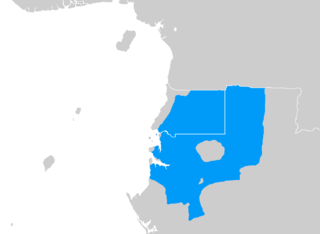
Back Fang AF Idioma fang AST فانق دیلی AZB Llengua fang Catalan Ffangiaid CY Fang (Sprache) German Fanga lingvo EO Idioma fang Spanish Fangi keel ET Fangera EU
| Fang | |
|---|---|
| Pangwe | |
| Faŋ, Paŋwe | |
| Native to | Equatorial Guinea, Gabon, Republic of the Congo, Cameroon, and São Tomé and Príncipe |
| Ethnicity | Fang |
Native speakers | 1 million (2006–2013)[1] |
| Dialects |
|
| Official status | |
Recognised minority language in | |
| Language codes | |
| ISO 639-2 | fan |
| ISO 639-3 | fan |
| Glottolog | fang1246 |
A.75,751[2] | |
 Idioma fang (Fang language) spread | |
Fang (/ˈfɒŋ/) is a Central African language spoken by around one million people, most of them in Equatorial Guinea, and northern Gabon, where it is the dominant Bantu language; Fang is also spoken in southern Cameroon, the Republic of the Congo, and small fractions of the islands of São Tomé and Príncipe. It is related to the Bulu and Ewondo languages of southern Cameroon.
Under President Macías Nguema, Fang was the official language of Equatorial Guinea, although in 1982, the Third Constitution once again replaced it with Spanish. Since then, each version of the Constitution has recognized Fang and other languages indigenous to the country as integral to the national culture, despite these languages not having official status.
There are many different variants of Fang in northern Gabon and southern Cameroon. Maho (2009) lists Southwest Fang as a distinct language. The other dialects are Ntoumou, Okak, Mekê, Atsi (Batsi), Nzaman (Zaman), Mveni, and Mvaïe.
- ^ Fang at Ethnologue (18th ed., 2015) (subscription required)
- ^ Jouni Filip Maho, 2009. New Updated Guthrie List Online